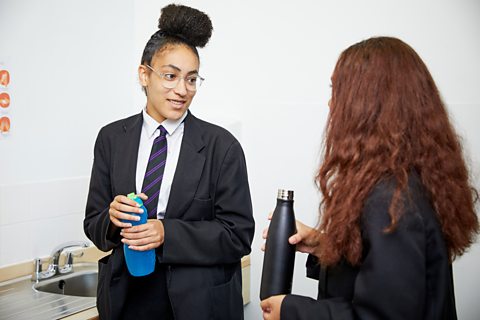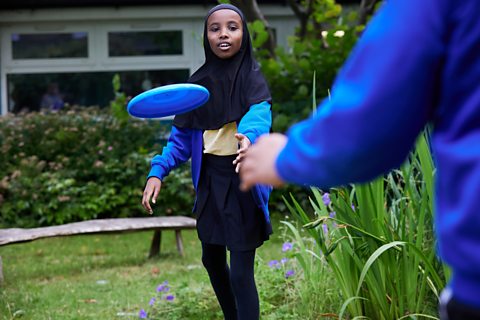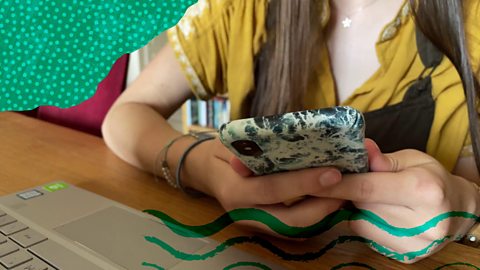
Welcome to The Regenerators.
Care about the planet but still want to have fun?
There are simple ways that your hobbies can be kinder to the planet (without compromising too much on the fun bit!).
Having a hobby that brings you joy can make you feel good and be a chance to learn new skills. Whatever you like doing in your spare time, there are things you can try to make it have a more positive impact on the planet.
Check out ways to make your hobbies more sustainable
Brothers Noah and Simeon, part of eco-community choir ‘SOS from the Kids’, and their friends Alicia and Nayan explore how their hobbies can be fun for them and the planet.
Noah: We love going to music festivals.
Simeon: And sports events, they're loads of fun.
Noah: But arts and music festivals generate about 23,500 tons of waste each year in the UK, plus nearly 20,000 tonnes of carbon emissions.
Simeon: And also somebody who goes to a sports event generates seven times the amount as somebody who isn't.
Noah: This is mostly due to travel emissions and the consumption of food and drink when you're at the event.
Simeon: When we go to big events like music festivals, we try to think about how we can cut down on our carbon footprint as much as possible. We've got a couple of friends together to explore how to make leisure activities more environmentally friendly.
How are greener festivals different from like normal ones?
Rob da Bank: Our audience, you know, don't leave trash everywhere. They put the stuff in the right recycling bin. The traders know that they can't bring plastic on-site.
But, you know, there's no point in pretending that we are totally green because most people have to drive to Camp Bestival. So already we're causing a carbon footprint right from the off.
Noah: What are the biggest things you can do to make your festival more eco friendly?
Rob da Bank: Talk to your audience about bringing less cars. If you've got 30,000 people turning up, that's obviously a massive one. And then even with artists' riders we'll say: Well you're not going to get any water, but here's a recycled bottle, fill it up.
It's all of our responsibility, isn't it? whether you're a customer or the promoter or the band, everyone needs to do their bit.
Nayan: As a golfer I try and do what I can, to be as eco friendly as possible by taking drinks from home in my own bottle instead of buying bottled water.
I buy most of my golf equipment, second-hand from my golf clubs, to my golf trolley, to my gold bag. And I use bamboo golf tees, a sustainable alternative to using plastics tees.
Alicia: One of the ways that you can be sustainable is by recycling, reusing anything that fits into your everyday hobbies and interests.
So one of the ways that I do these things is by doing natural dye, which includes collecting all these jars and all these bottles. I store all my natural dyes into the glass bottles or I repaint some of them just for décor around the house.
So we have red cabbage and red onion, it surprises you avocado is my favourite because you see its green skin and yet it makes the brightest pink that you've ever seen.
You don't look at food the same way.
Not only can it be used like you know, for composting and all those things there, but you can create art from it.
Noah: I think I've learnt how not to waste so much. One of the biggest impacts is actually travel to the festival, so they're trying to encourage people to use public transport.
And I think I'll try to like, bring my own water bottle.
Simeon: Also maybe pack your own lunches, so you don't have to get stuff there, which is wrapped in plastic.
Nayan: I've discovered the level of impact I have on the environment through golf. The amount of plastic from water bottles by one person alone is already major and then when there's hundreds and hundreds playing that alone is a really big contributor. We all need to keep on top of it otherwise nothing's going to happen.
Be mindful of your rubbish
Whether you’re creating a scrapbook or attending a sports event, see if you can minimise how much you throw away and make sure you put your rubbish in the right bins. If while you’re out and about the bins are full or overflowing, or if there are no bins available, consider giving your litter a lift and taking it home.
Car share or public transport
If your hobbies require you to travel and you don’t have loads of stuff to carry, see if you can share the car journey with friends or take public transport to the venue.
Sharing a vehicle with others is more efficient, reduces your environmental impact, and can make the journey cheaper.
Bring your own food and drinks

Where possible, try bringing your own packed lunch or snacks in a reusable container as this can help to reduce packaging waste.
You can also bring a reusable water bottle to save you from buying bottled water.

Buy second-hand equipment
Most sport or arts and crafts equipment can be purchased second-hand. They are usually still in great conditions.

If you’re trying a new sport or hobby, buying second-hand would be a great way to try the tools or instruments without it costing the earth.
Got all the equipment you need? Look after them by cleaning them regularly and storing them safely to keep them last longer.
Experiment with waste
Need inspiration for your next art project? Have a look around the house to see if there are any unwanted items (like old glass jars or old t-shirts) that you can transform into something new or an art piece, or that you can use to organise your tools.
Make a difference
Discover more about the planet and how to protect it with the BBC.
How to reduce the environmental impact of your devices
THE REGENERATORS

Quiz: Can you guess the green celebrities?
THE REGENERATORS

Four ways to give back to nature through rewilding
THE REGENERATORS

Return to the homepage
Back to The Regenerators
BBC BITESIZE
